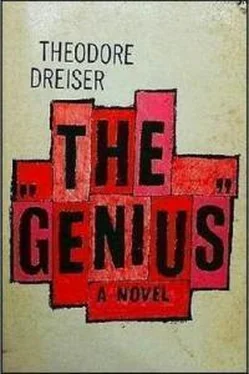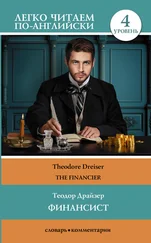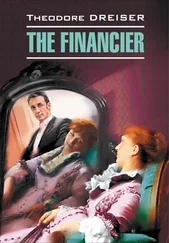Теодор Драйзер - The Genius
Здесь есть возможность читать онлайн «Теодор Драйзер - The Genius» весь текст электронной книги совершенно бесплатно (целиком полную версию без сокращений). В некоторых случаях можно слушать аудио, скачать через торрент в формате fb2 и присутствует краткое содержание. Год выпуска: 2014, Издательство: epubBooks Classics, Жанр: Классическая проза, на английском языке. Описание произведения, (предисловие) а так же отзывы посетителей доступны на портале библиотеки ЛибКат.
- Название:The Genius
- Автор:
- Издательство:epubBooks Classics
- Жанр:
- Год:2014
- ISBN:нет данных
- Рейтинг книги:4 / 5. Голосов: 1
-
Избранное:Добавить в избранное
- Отзывы:
-
Ваша оценка:
- 80
- 1
- 2
- 3
- 4
- 5
The Genius: краткое содержание, описание и аннотация
Предлагаем к чтению аннотацию, описание, краткое содержание или предисловие (зависит от того, что написал сам автор книги «The Genius»). Если вы не нашли необходимую информацию о книге — напишите в комментариях, мы постараемся отыскать её.
The Genius — читать онлайн бесплатно полную книгу (весь текст) целиком
Ниже представлен текст книги, разбитый по страницам. Система сохранения места последней прочитанной страницы, позволяет с удобством читать онлайн бесплатно книгу «The Genius», без необходимости каждый раз заново искать на чём Вы остановились. Поставьте закладку, и сможете в любой момент перейти на страницу, на которой закончили чтение.
Интервал:
Закладка:
"Why don't you go to see a practitioner, Eugene?" she begged of him one day. "You will get help—really you will. You think you won't, but you will. There is something about them—I don't know what. They are spiritually at rest. You will feel better. Do go."
"Oh, why do you bother me, Myrtle? Please don't. I don't want to go. I think there is something in the idea metaphysically speaking, but why should I go to a practitioner? God is as near me as He is anyone, if there is a God."
Myrtle wrung her hands, and because she felt so badly more than anything else, he finally decided to go. There might be something hypnotic or physically contagious about these people—some old alchemy of the mortal body, which could reach and soothe him. He believed in hypnotism, hypnotic suggestion, etc. He finally called up one practitioner, an old lady highly recommended by Myrtle and others, who lived farther south on Broadway, somewhere in the neighborhood of Myrtle's home. Mrs. Althea Johns was her name—a woman who had performed wonderful cures. Why should he, Eugene Witla, he asked himself as he took up the receiver, why should he, Eugene Witla, ex–managing publisher of the United Magazines Corporation, ex–artist (in a way, he felt that he was no longer an artist in the best sense) be going to a woman in Christian Science to be healed of what? Gloom? Yes. Failure? Yes. Heartache? Yes. His evil tendencies in regard to women, such as the stranger who had sat beside him had testified to? Yes. How strange! And yet he was curious. It interested him a little to speculate as to whether this could really be done. Could he be healed of failure? Could this pain of longing be made to cease? Did he want it to cease? No; certainly not! He wanted Suzanne. Myrtle's idea, he knew, was that somehow this treatment would reunite him and Angela and make him forget Suzanne, but he knew that could not be. He was going, but he was going because he was unhappy and idle and aimless. He was going because he really did not know what else to do.
The apartment of Mrs. Johns—Mrs. Althea Johns—was in an apartment house of conventional design, of which there were in New York hundreds upon hundreds at the time. There was a spacious areaway between two wings of cream–colored pressed brick leading back to an entrance way which was protected by a handsome wrought–iron door on either side of which was placed an electric lamp support of handsome design, holding lovely cream–colored globes, shedding a soft lustre. Inside was the usual lobby, elevator, uniformed negro elevator man, indifferent and impertinent, and the telephone switchboard. The building was seven storeys high. Eugene went one snowy, blustery January night. The great wet flakes were spinning in huge whirls and the streets were covered with a soft, slushy carpet of snow. He was interested, as usual, in spite of his gloom, in the picture of beauty the world presented—the city wrapped in a handsome mantle of white. Here were cars rumbling, people hunched in great coats facing the driving wind. He liked the snow, the flakes, this wonder of material living. It eased his mind of his misery and made him think of painting again. Mrs. Johns was on the seventh floor. Eugene knocked and was admitted by a maid. He was shown to a waiting room, for he was a little ahead of his time, and there were others—healthy–looking men and women, who did not appear to have an ache or pain—ahead of him. Was not this a sign, he thought as he sat down, that this was something which dealt with imaginary ills? Then why had the man he had heard in the church beside him testified so forcibly and sincerely to his healing? Well, he would wait and see. He did not see what it could do for him now. He had to work. He sat there in one corner, his hands folded and braced under his chin, thinking. The room was not artistic but rather nondescript, the furniture cheap or rather tasteless in design. Didn't Divine Mind know any better than to present its representatives in such a guise as this? Could a person called to assist in representing the majesty of God on earth be left so unintelligent artistically as to live in a house like this? Surely this was a poor manifestation of Divinity, but―
Mrs. Johns came—a short, stout, homely woman, gray, wrinkled, dowdy in her clothing, a small wen on one side of her mouth, a nose slightly too big to be pleasing—all mortal deficiencies as to appearance highly emphasized, and looking like an old print of Mrs. Micawber that he had seen somewhere. She had on a black skirt good as to material, but shapeless, commonplace, and a dark blue–gray waist. Her eye was clear and gray though, he noticed, and she had a pleasing smile.
"This is Mr. Witla, I believe," she said, coming across the room to him, for he had got into a corner near the window, and speaking with an accent which sounded a little Scotch. "I'm so glad to see you. Won't you come in?" she said, giving him precedence over some others because of his appointment, and re–crossed the room preceding him down the hall to her practice room. She stood to one side to take his hand as he passed.
He touched it gingerly.
So this was Mrs. Johns, he thought, as he entered, looking about him. Bangs and Myrtle had insisted that she had performed wonderful cures—or rather that Divine Mind had, through her. Her hands were wrinkled, her face old. Why didn't she make herself young if she could perform these wonderful cures? Why was this room so mussy? It was actually stuffy with chromos and etchings of the Christ and Bible scenes on the walls, a cheap red carpet or rug on the floor, inartistic leather–covered chairs, a table or desk too full of books, a pale picture of Mrs. Eddy and silly mottoes of which he was sick and tired hung here and there. People were such hacks when it came to the art of living. How could they pretend to a sense of Divinity who knew nothing of life? He was weary and the room here offended him. Mrs. Johns did. Besides, her voice was slightly falsetto. Could she cure cancer? and consumption? and all other horrible human ills, as Myrtle insisted she had? He didn't believe it.
He sat down wearily and yet contentiously in the chair she pointed out to him and stared at her while she quietly seated herself opposite him looking at him with kindly, smiling eyes.
"And now," she said easily, "what does God's child think is the matter with him?"
Eugene stirred irritably.
"God's child," he thought; "what cant!" What right had he to claim to be a child of God? What was the use of beginning that way? It was silly, so asinine. Why not ask plainly what was the matter with him? Still he answered:
"Oh, a number of things. So many that I am pretty sure they can never be remedied."
"As bad as that? Surely not. It is good to know, anyhow, that nothing is impossible to God. We can believe that, anyhow, can't we?" she replied, smiling. "You believe in God, or a ruling power, don't you?"
"I don't know whether I do or not. In the main, I guess I do. I'm sure I ought to. Yes, I guess I do."
"Is He a malicious God to you?"
"I have always thought so," he replied, thinking of Angela.
"Mortal mind! Mortal mind!" she asseverated to herself. "What delusions will it not harbor!"
And then to him:
"One has to be cured almost against one's will to know that God is a God of love. So you believe you are sinful, do you, and that He is malicious? It is not necessary that you should tell me how. We are all alike in the mortal state. I would like to call your attention to Isaiah's words, 'Though your sins be as scarlet, they shall be as white as snow; though they be red like crimson, they shall be as wool.'"
Eugene had not heard this quotation for years. It was only a dim thing in his memory. It flashed out simply now and appealed, as had all these Hebraic bursts of prophetic imagery in the past. Mrs. Johns, for all her wen and her big nose and dowdy clothes, was a little better for having been able to quote this so aptly. It raised her in his estimation. It showed a vigorous mind, at least a tactful mind.
Читать дальшеИнтервал:
Закладка:
Похожие книги на «The Genius»
Представляем Вашему вниманию похожие книги на «The Genius» списком для выбора. Мы отобрали схожую по названию и смыслу литературу в надежде предоставить читателям больше вариантов отыскать новые, интересные, ещё непрочитанные произведения.
Обсуждение, отзывы о книге «The Genius» и просто собственные мнения читателей. Оставьте ваши комментарии, напишите, что Вы думаете о произведении, его смысле или главных героях. Укажите что конкретно понравилось, а что нет, и почему Вы так считаете.









